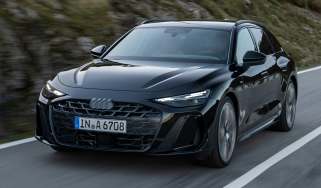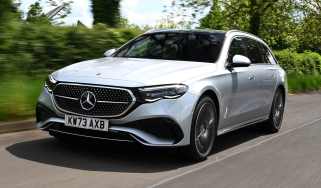Hyundai i30 estate (2007-2011)
"The i30 Estate is practical and well built. What's more, it offers great value and is cheap to run - but it isn't much bigger than the standard hatchback."
Pros
- Five-year, unlimited mileage warranty
- Spacious cabin
- Generous standard equipment list
Cons
- Limited engine range
- Boot not much bigger than hatchback
- Some interior plastics could be better
The Hyundai i30 introduced previously unseen standards of quality, practicality and desirability into the Korean firm’s cars. That this move would lead to success was obvious from the start, but proven later by way of a first place finish overall in the Driver Power 2010 customer survey. Owners heaped unanimous praise on the family car for its reliability, quality and comfort. The i30 Estate retains the hatchback’s cabin space, ease of driving, good build quality and reliability, but adds the practicality of a bigger boot. However, the boot isn’t that much larger, and is beaten by rivals like the Ford Focus for outright cargo space.
MPG, running costs & CO2
The 115bhp CRDi diesel, returning 62.8mpg and 119g/km, is by far the most economical engine and best suited to the Estate. Expect just over 40mpg from either of the petrol engines – so only consider them if you’ll be doing low mileages and won’t recoup the extra cost of the diesel engine. Start-stop technology, which will save fuel at traffic lights, junctions and in jams, is available as an option, too.
Engines, drive & performance
With an easily-adjusted driving position and light controls, the i30 Estate is an effortless car to drive. The brakes are strong, the steering is light and accurate, and gears are easy to find. The major heating and stereo controls are placed high on the dashboard close to the steering wheel, so they are easy to reach when on the move. Two petrol engines and one diesel are available, but it’s the latter that makes the most sense. It feels quick because it has more pulling power from low revs than the petrol engines. Pile your i30 with people and luggage, and the 1.4 and 1.6-litre petrol engines will both struggle with the weight.
Interior & comfort
Like the hatchback, the i30 Estate is as comfortable as you could want a reasonably priced family hatchback to be. There’s enough leg and headroom that four tall adults will find long journeys comfortable. Wind noise isn’t an issue, even on the motorway. The suspension copes well with bumps, smoothing over most roads without you noticing, and the diesel engine is quiet at idle, and on the move.
Practicality & boot space
The Hyundai i30 Estate is one of the smaller medium family estates around, with 415 litres of space with the rear seats in place and a maximum of 1,395 litres available - a Ford Focus Estate has 475 litres and 1,525 litres respectively. However, there are some thoughtful stowage solutions, like a space under the boot floor for storing smaller items out of sight, and a cargo net to hold bags in place. The cabin is littered with extra storage, too: there’s a sunglasses holder, a small box built into the dash, an air-conditioned glovebox and map pockets in the seats.
Reliability & safety
A five-star Euro NCAP rating, six airbags, anti-whiplash head restraints and electronic stability control all suggest that the i30 is a safe car. What's more, it banishes the cheap image of past Hyundais by way of a 3rd place in the reliability section of the Driver Power 2010 survey. It doesn’t have the all-round air of quality that a Volkswagen Golf offers, but the cabin feels built to last.
Price, value for money & options
The two specification levels, Comfort and Premium, offer air-conditioning, alloy wheels and electric windows as standard. Premium is positively luxurious, adding climate control, rear parking sensors, rain-sensing wipers and heated front seats. There’s a five-year unlimited mileage warranty, too. Only Kia and Skoda can really match Hyundai for value.
Which Is Best?
Cheapest
- Name1.5T GDi 48v Hybrid Advance 5dr
- Gearbox typeManual
- RRP£25,275
Most Economical
- Name1.5T GDi 48v Hybrid Advance 5dr DCT
- Gearbox typeSemi-auto
- RRP£26,475
Fastest
- Name1.5T GDi 48v Hybrid Advance 5dr
- Gearbox typeManual
- RRP£25,275













